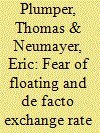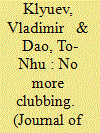| Srl | Item |
| 1 |
ID:
109583


|
|
|
|
|
| Publication |
2011.
|
| Summary/Abstract |
This paper adopts and develops the "fear of floating" theory to explain the decision to implement a de facto peg, the choice of anchor currency among multiple key currencies, and the role of central bank independence for these choices. We argue that since exchange rate depreciations are passed-through into higher prices of imported goods, avoiding the import of inflation provides an important motive to de facto peg the exchange rate in import-dependent countries. This study shows that the choice of anchor currency is determined by the degree of dependence of the potentially pegging country on imports from the key currency country and on imports from the key currency area, consisting of all countries which have already pegged to this key currency. The fear of floating approach also predicts that countries with more independent central banks are more likely to de facto peg their exchange rate since independent central banks are more averse to inflation than governments and can de facto peg a country's exchange rate independently of the government.
|
|
|
|
|
|
|
|
|
|
|
|
|
|
|
|
| 2 |
ID:
154531


|
|
|
|
|
| Summary/Abstract |
This paper examines exchange rate behaviour in the ASEAN-5 countries (Indonesia, Malaysia, the Philippines, Singapore, and Thailand). It finds that for the last ten years, there is no evidence that their central banks target particular exchange rate levels against any currency or basket. Thus, contrary to some assertions, they do not belong to a dollar club, a yen club, a renminbi club, or an ASEAN club. At the same time, they clearly try to smooth short-term volatility, particularly vis-à-vis the U.S. dollar. The degree of smoothing declined noticeably after the Asian Financial Crisis and less obviously after the Global Financial Crisis, with heterogeneity across countries. Short-term smoothing without level targeting does not interfere with monetary policies aimed at price stability.
|
|
|
|
|
|
|
|
|
|
|
|
|
|
|
|